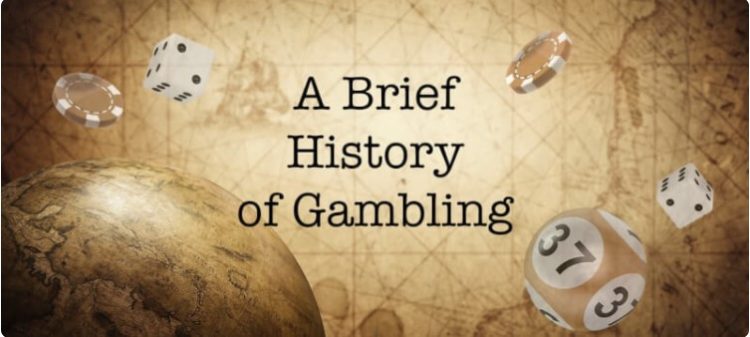We are not going to give the name of the first gambler in the history of humankind, of course. It would be almost as hard as finding our contemporary who hasn’t gambled at least once in their life. Even though today’s casino fun is more than easy to access with hundreds (or even thousands) of options online casinos offer: free demo versions of the best Australian online pokies, online gambling for real money, Roulette, Poker, mobile and desktop compatibility, and various kinds of promos… Finding the first gambler in the history of mankind was much harder than finding a non-gambler of today.
The one certain thing is the fact that people have been gambling longer than we are used to thinking. We didn’t take up this fun activity in the 19th century with the spread of Blackjack infatuation, nor in the 18th – when the world was shivering with Roulette fever. And if you think of Baccarat (apparently, some historians believe it might have appeared in the 14th – 15th centuries), you will still underestimate humanity. Take it up (or better say, back) a notch! It’s time to dig into the dusty manuscripts.
Did the Egyptians manage to leave their footprints even here?
Let’s set the record straight from the beginning and say that the very first gambling game doesn’t have anything to do with cards. It is dice. According to the Encyclopedia Britannica, it is also the oldest gaming implement. And, believe it or not, they are magic! Ok, we will put it differently: they come from the magical traditions of more primitive tribes who used to throw some knucklebones of sheep or bulls around for future predictions and decision-making.
The oldest dice that look similar to what we know is claimed to have been found in an Egyptian tomb of 3,000 BC. But can we be sure that its owner took it literally to the grave because he was fond of gambling? Not really. What if he was more into the idea of their prophetic functions?
The Greeks again?
The people of Ancient Greece did like to gamble. Legend has it that one of the Trojan War (1194 – 1184 BC) heroes, Palamedes, invited the soldiers to play dice to kill time during the siege. Let’s not forget the most high-profile Greek event – Olympic Games – whose first record dates back to the year 776 BC. Sports betting was a huge part of the event – crowd-pleasing, exciting, doubling, tripling, quadrupling the enjoyment…
In Sparta, by the way, gambling was forbidden. And so was in the city of Ancient Rome. The restriction prompted the Romans to invent the first-ever gambling chips. The game rules said that anyone caught gambling in the city would have to pay the penalty of 4 times the wage. So, when caught, the Roman gambler would take the chips out of the pocket to demonstrate the harmless intent of playing just for fun and avoid paying anything to the authorities.

Was the first-ever gambler from India?
In ancient India like in many other places a long-long-long…time ago, the dice was a popular game. In the Rigveda – a collection of religious hymns, a part of the sacred Vedas – there is a poem that warns the citizens against the negative impact of gambling and suggests more ennobling activities. “Don’t play dice, but plow your furrow! Find pleasure in what you have and value it! Better take care of your cattle and your wife, despicable gambler!” And it is not the only mention of the dice games found in the sacred texts.
That all sounds interesting, you’ll say, but what about any kind of historical accuracy? Where to put those Indian gamblers who preferred playing the dice much more than plowing Earth on the time scale? Well, evidently, the texts of the Rigveda have been passed over orally since about 2,000 BC. Then, it looks like the Indians have beaten the Greeks… But are they the ultimate winners?
Do the Chinese have to say anything on the subject?
Let’s take it even further and adjust our Time Machine settings to take us to ancient China.
We have talked about how dice were the oldest game equipment, but the Chinese outplayed us in this question. They didn’t even need any equipment as they are believed to have invented a prototype of the familiar to us Lottery or Keno.
Archeologists found tiles (dating 2,300 BC) that reminded them of a field for a lottery-type game. “Book of Songs” mentions a game called ‘drawing of wood’, and many scientists believe that the tiles and the woods were the two parts of the same game.
Another gambling fun fact. Sometime in 200 BC, the Chinese government might have organized a national-scale lottery to raise seed money for one of the most impressive World Wonders – The Great Wall of China.
We are not saying that the Chinese were the first gamblers in human history: there is enough evidence that people have been placing money at stake for different reasons since they learnt to play games. The Chinese gambling evidence is officially recorded: that’s the main thing.
And we know that Backgammon is about 5,000 years old, and its younger brothers, Go and Chess, are not as young anymore – 4,000 and 1,500 years old, respectively. Knowing our human nature too well, we will dare guess that mankind has been gambling approximately since then.
- Comprehensive Guide to the Board Game Go (weiqi, baduk) - January 23, 2024
- Are Creative Suites Changing Gaming - October 30, 2023
- How Classic Games Have Been Reimagined for Modern Audiences - October 5, 2023